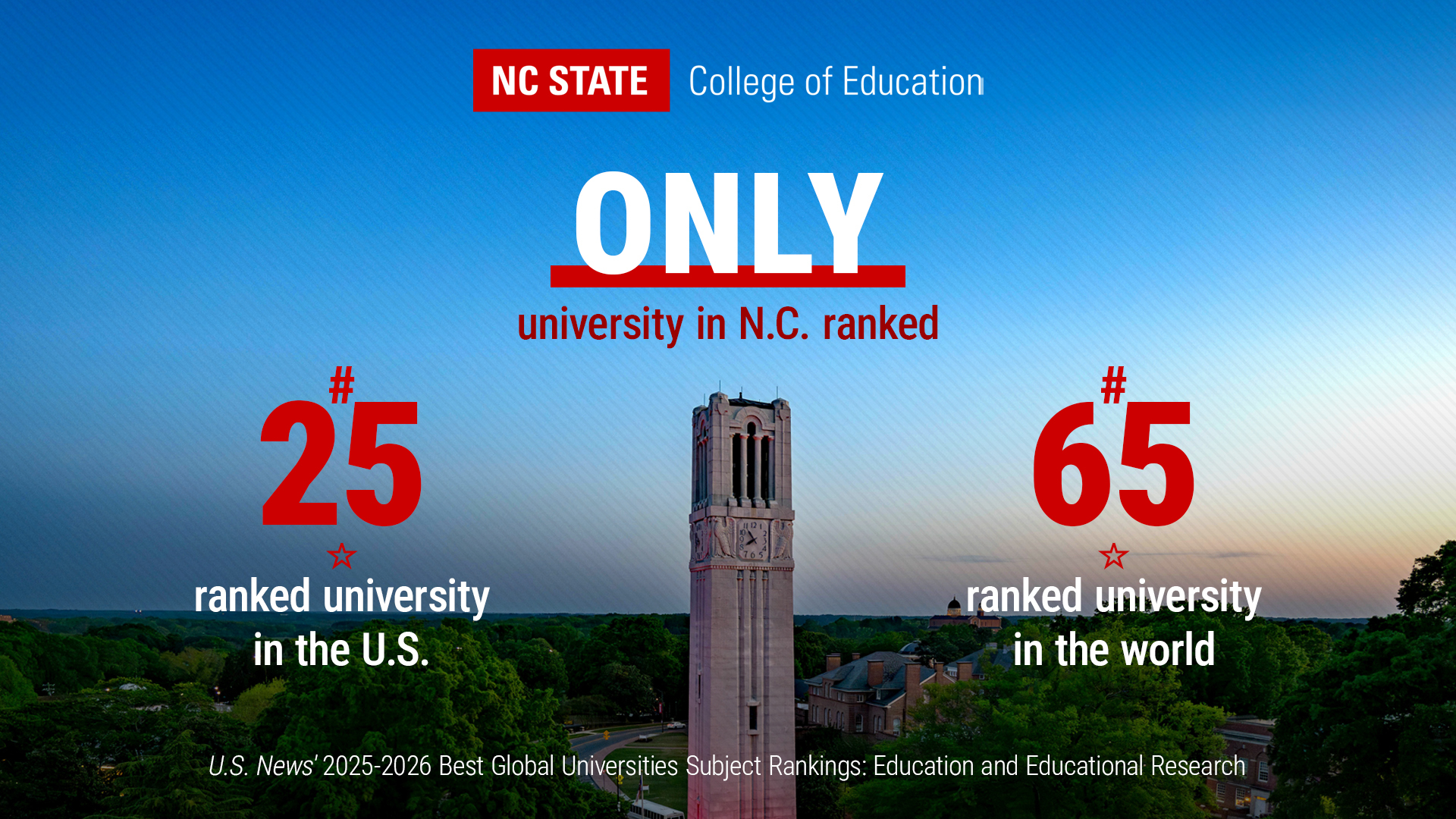Assistant Professor Michelle Falter and 11 College of Education Doctoral Students Co-Author Paper Focused on Conducting Focus Groups Through Zoom

In March 2020, NC State College of Education Assistant Professor Michelle Falter was teaching a course on interviewing and focus groups in qualitative methods when the COVID-19 pandemic forced the class to shift online.
Although Falter had some previous experience with Zoom, she had never experienced conducting focus groups in a synchronous, online setting and noticed there was not much methodological literature available on how to approach the challenge.
As she and her class of 15 doctoral students navigated the world of online qualitative research, they decided it would be helpful to document their experiences to share with other researchers.
“I had asked the class if they were interested in writing a paper with me, because I felt like it was such an opportune moment and one that I thought would be beneficial to a lot of other researchers who are dealing with this transition from in-person research to online research,” Falter said.
Of the 15 students in the class, 11 doctoral students decided to work with Falter in May and June 2020 to co-author “Making Room for Zoom in Focus Group Methods: Opportunities and Challenges for Novice Researchers (During and Beyond COVID-19).” In the self-study, Falter and the students reflect on the opportunities and challenges they experience as moderators and participants in Zoom focus groups during the course.
The students, who come from all three of the college’s Ph.D. programs, divided up into groups to tackle different aspects of the writing process, then came back together to share work, collaborate and find a cohesive voice for the piece.
The unique ability to work with students from different academic backgrounds, and who were at different points in their doctoral journeys, was an asset to the process, said Laura Jacobs, a student in the Ph.D. in Teacher Education and Learning Sciences’ Literacy and English Language Arts Education program area of study.
“We’ve all had different experiences with the writing process, so we were able to support each other in different ways. It wasn’t just about being able to see something from a different view; we were also able to learn together and learn from the strengths of everyone working together and having different experiences,” she said.
Preparing for Future Academic Careers
For many of the student co-authors, this paper was their first experience with submitting writing to a journal for publication. From when the group submitted the piece to their first journal to when it was finally published, the process took over a year and a half.
This process of waiting, rejection, rewriting and resubmitting is one Aaron Arenas, a student in the Ph.D. in Educational Leadership, Policy and Human Development Higher Education program area of study, said he was prepared for based on stories he’s heard from other colleagues.
Experiencing the process first-hand, as a student, has helped to better prepare him for what producing publications as a future researcher will be like.
“It was good to see as a student, to know that when we go through this as a future faculty member that we just have to keep trying and keep going until we are able to get our work out there,” Arenas said. “There were some trials and tribulations to writing it, but now that it’s published, I look back on this process, and I’m glad we did this. It’s a major accomplishment that we came together as a class, which you don’t hear about often, and I think it’s something that we should be proud about.”
Since it was published online in January, the article has been downloaded more than 260 times and has been widely shared and discussed among online groups of qualitative researchers, Falter said.
Bridging Research and Practice
The goal of the paper is to help other researchers navigate the world of online focus groups, but even the paper’s authors have taken their own advice, drawing on the findings presented in the publication when working on other projects.
Xavier Cason, a student in the Ph.D. in Educational Leadership, Policy, and Human Development Educational Evaluation and Policy Analysis program area of study, said he has pulled directly from the article in his role as the director of Community Schools and School Transformations for the Durham Public Schools Foundation.
In that role, he has been teaching undergraduate students from Duke University and North Carolina Central University who are conducting interviews and focus groups as part of an ongoing research project involving community schools. Cason has been able to update the lessons around focus groups for the students, using best practices outlined in the article he co-authored, so the students are prepared to conduct interviews in a virtual environment.
“I’ve pulled directly from this article, and it gave me such a practical document. I’m able to actually refresh what the curriculum was based on what we had done, and that was a thrill,” Cason said. “I’m able to pull directly from this article to show what we went through and what could possibly happen in their experiences.”
Arenas said he has also applied principles outlined in the paper to a more recent research project.
He said the use of dual moderators when conducting a focus group – so that one person can serve as a note taker and another can remain focused on participants to keep them engaged – is one practice from the class he has found particularly useful.
“It’s super important to make sure that you’re getting people involved because Zoom fatigue is a thing, and one way that we can combat that is making sure that one person is just attentive to everyone, playing off everyone’s comments,” he said. “That’s one example that I can think of where I’ve used what we learned from this experience in actual life, and it’s helped greatly for me.”
Jacobs, along with Nada Wafa, a student in the Ph.D. in Teacher Education and Learning Sciences Social Studies Education program area of study, have found their experience with Zoom focus groups to be particularly useful as they complete their dissertations.
Although Jacobs’ dissertation will focus on teachers in Wake County, ongoing restrictions related to the pandemic prevent her from going into the schools, so understanding how to successfully conduct focus groups online will be an asset, she said. Additionally, Wafa, whose research focuses on global education, has been able to connect with teachers across the globe via Zoom.
“Classroom-based research is difficult at this point with the COVID situation, so having this as a tool is very important for us as researchers in doing this work,” Wafa said. “Zoom has been a lifesaver in regards to connecting with teachers all around the world.”
Inspiring Other Researchers
Gordon Maples, a student in the Ph.D. in the Educational Leadership, Policy, and Human Development Higher Education Opportunity, Equity, and Justice program area of study, is already thinking about future ways Zoom could actually be advantageous for qualitative research.
Maples had prior experience with in-person focus groups that were filmed. However, those sessions were often recorded from a top-down angle and were not close enough to capture certain aspects of body language or facial expressions, he said. Zoom, meanwhile, can catch more intricacies and, combined with the use of the chat feature, can be a rich source of data.
“The way that Zooms frames, particularly on faces, I think it does a really good job of catching gaze and facial movements. That kind of thing can be really helpful for reviewing,” he said. “Using Zoom for this sort of methodological exercise has made me think about how to potentially use this going forward for visual-based qualitative work.”
Falter hopes that, going forward, the paper can help not only other researchers who need to conduct online focus groups, but other scholars who are teaching qualitative methods classes.
In addition to being able to use the practical information presented in the study, she hopes that other faculty can view the collaboration as a model to work with their students and create published works that address other pressing issues in the field.
“I hope that other people who do this work can see this as a model of working with their students to inquire into issues in qualitative research and do this sort of group writing around these problems because there are so many problems in qualitative research that need to be explored and talked through,” Falter said. “I’m not saying what we did is the only way to do this, but I think it’s a good example of one way this can be done with students in Ph.D. level classes.”
Below is a full list of College of Education doctoral students who co-authored “Making Room for Zoom in Focus Group Methods: Opportunities and Challenges for Novice Researchers (During and Beyond COVID-19).”
- Aaron Arenas, student in the Ph.D. in Educational Leadership, Policy and Human Development Higher Education program area of study
- Gordon Maples, student in the Ph.D. in Educational Leadership, Policy, and Human Development Higher Education Opportunity, Equity, and Justice program area of study
- Chelsea Smith, student in the Ph.D. in Educational Leadership, Policy and Human Development Higher Education program area of study
- Lisa Lamb, student in the Ph.D. in Teacher Education and Learning Sciences Social Studies Education program area of study
- Michael Anderson, student in the Ph.D. in Teacher Education and Learning Sciences Literacy and English Language Arts Education program area of study
- Elizabeth Uzzell, student in the Ph.D. in Educational Leadership, Policy, and Human Development Educational Evaluation and Policy Analysis program area of study
- Laura Jacobs, student in the Ph.D. in Teacher Education and Learning Sciences’ Literacy and English Language Arts Education program area of study
- Xavier Cason, student in the Ph.D. in Educational Leadership, Policy, and Human Development Educational Evaluation and Policy Analysis program area of study
- Tiara Griffis, student in the Ph.D. in Teacher Education and Learning Science Educational Psychology program area of study
- Megan Polzin, student in the Ph.D. in Learning and Teaching in STEM Science Education program area of study
- Nada Wafa, student in the Ph.D. in Teacher Education and Learning Sciences Social Studies Education program area of study
- Categories:


